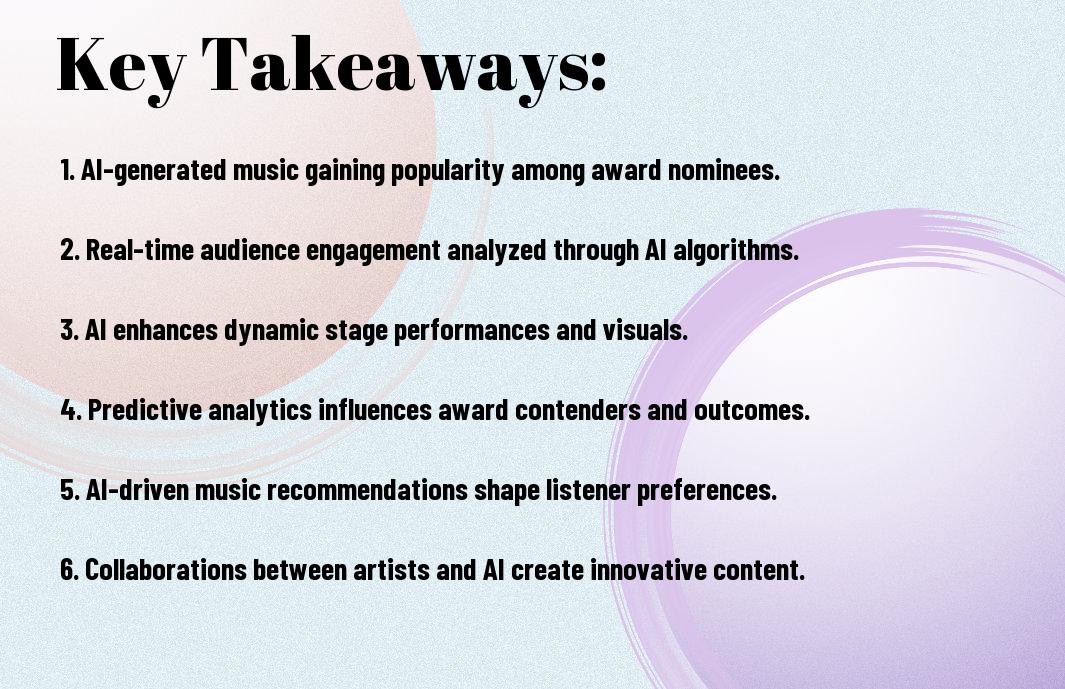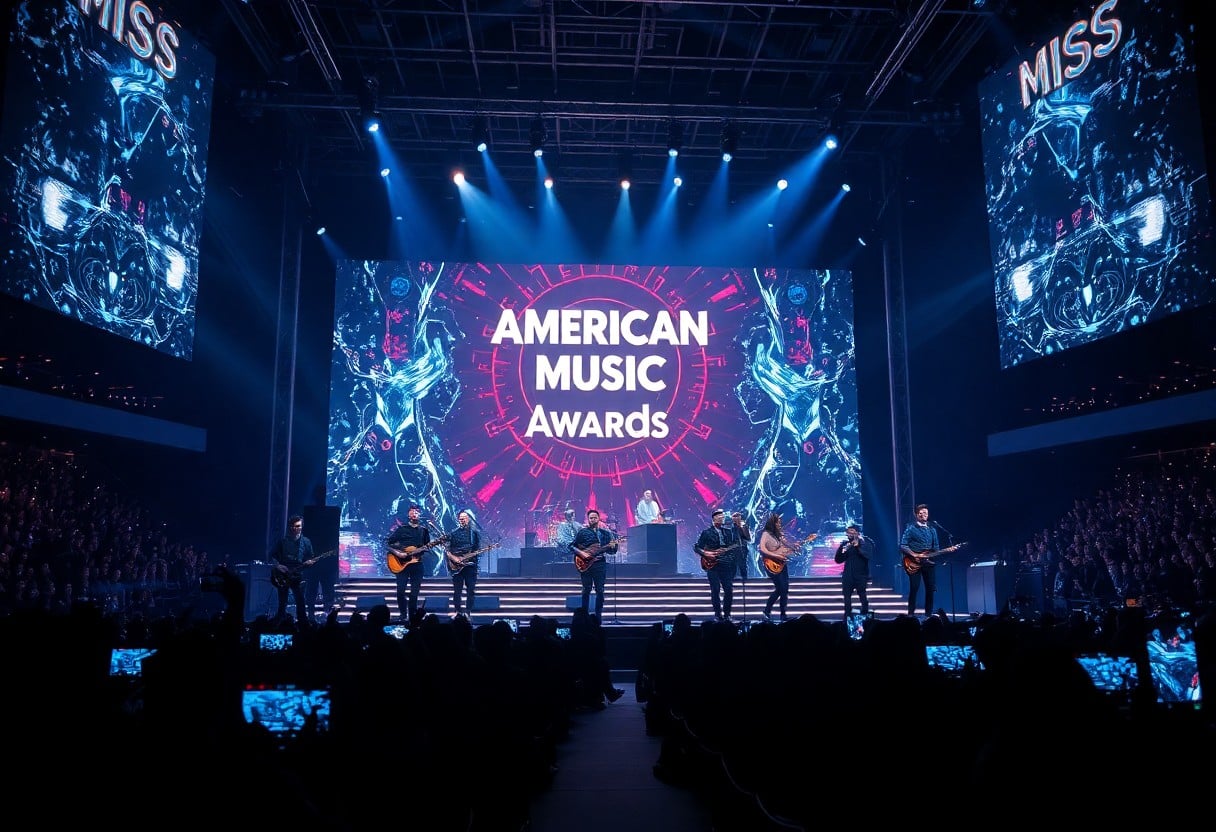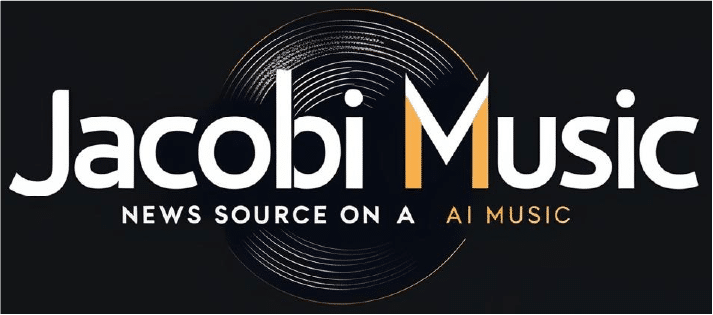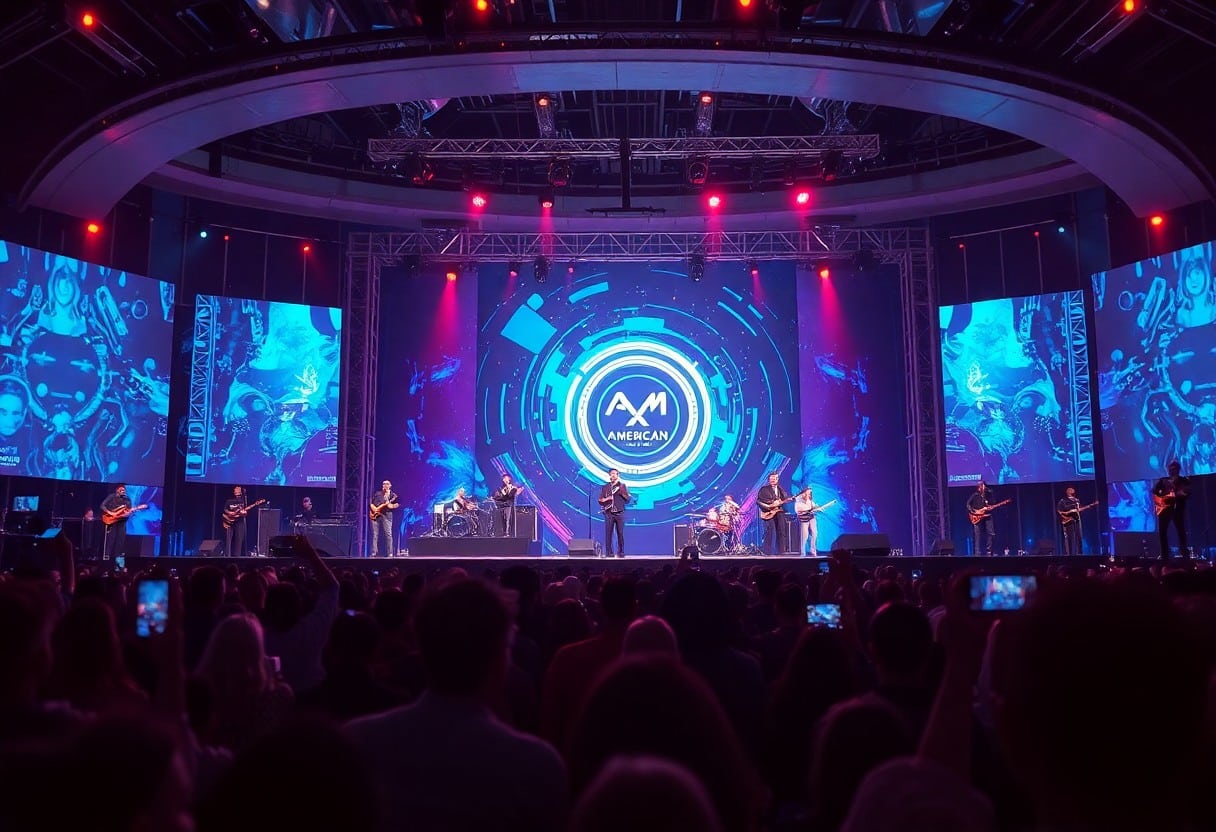AI is transforming how we experience and understand trends in the American Music Awards. In this blog post, I will explore how artificial intelligence influences everything from music selection and performance styles to fan engagement and voting processes. As you research into this topic, you’ll see just how much AI is reshaping not only the awards themselves but the broader landscape of the music industry. Join me as we uncover the innovative technologies driving the change and what it means for artists and fans alike.
The Rise of AI in Music Production
Before the advent of AI, music production relied heavily on human intuition and manual labor. The emergence of artificial intelligence has revolutionized the industry, streamlining processes and enabling unprecedented creativity. I’ve observed how AI tools are now integral to production workflows, allowing musicians and producers to explore soundscapes that were once unimaginable. This evolution is not just a trend; it represents a fundamental shift in how music is created, mixed, and mastered.
AI-Driven Songwriting
At the intersection of technology and creativity, AI-driven songwriting is rapidly gaining traction. I find it fascinating how these algorithms analyze vast datasets of musical compositions, generating original melodies and lyrics. This technology enables artists to collaborate with AI, unlocking new creative possibilities and enhancing their songwriting process. As you consider the potential of AI songwriting tools, you’ll discover a powerful partner in your artistic journey.
Automated Music Mixing and Mastering
Mastering techniques have also evolved with automation, bringing precision to the mixing and mastering phases of production. As I dive deeper into this aspect of music, I realize that AI-driven tools can analyze tracks in real-time, adjusting levels, EQ, and effects to achieve a polished sound. These advancements allow producers to focus more on creativity while letting AI handle the technical nuances that may have previously consumed valuable time.
Another compelling feature of automated mixing and mastering is its ability to learn from user preferences. As you engage with these AI platforms, they adapt to your unique style, offering output that aligns closely with your artistic vision. This flexibility not only streamlines your workflow but also democratizes access to professional-quality production, enabling independent artists to compete on a global scale. Embracing these innovations can significantly elevate your sound, empowering you to produce music that resonates on a deeper level with your audience.

AI Influence on Artist Collaborations
Some artists are embracing AI technology to enhance collaboration in innovative ways. By leveraging AI algorithms, musicians can create unique partnerships that were once unimaginable, pushing the boundaries of creativity and experimentation. This allows them to explore new genres and styles, resulting in a vibrant fusion of sounds that captivates audiences. The collaborative landscape is evolving, and AI plays a significant role in shaping the future of music interactions.
Virtual Duets and Holograms
An exciting trend in artist collaborations is the use of virtual duets and holograms. Technology enables artists to perform together, even if they are miles apart. You can experience memorable performances with deceased legends brought to life through holograms, creating a unique connection between past and present artists. This innovation not only expands opportunities for collaborations but also engages fans in thrilling new ways.
AI as Creative Partners
Against the backdrop of traditional collaboration, AI emerges as a valuable creative partner in the music industry. Artists are now using AI tools to generate ideas, compose melodies, and even write lyrics, which allows them to experiment and evolve their sound without conventional constraints. This partnership can lead to exciting results, as the machine offers unexpected suggestions that inspire artists to think outside the box.
A growing number of musicians have found that AI can help enhance their creative process. By integrating AI software, you can generate a diverse array of music styles and arrangements that might not have been considered otherwise. You might use AI to generate backing tracks or experimental soundscapes, allowing for deeper exploration into different musical territories. This collaboration with AI not only enriches the creative experience but also reflects the dynamic nature of modern music and the endless possibilities that arise from it.

Trends in Award Nominations
For the American Music Awards, trends in nominations are increasingly influenced by technology and AI. As we analyze the landscape, I see a notable rise in artists incorporating AI-driven music creation processes. This evolution not only reflects changes in production techniques but also shifts in the types of artists being recognized, highlighting a blend of traditional and innovative approaches within the music industry.
AI-Generated Hits in Nomination Categories
AIGenerated tracks are gradually making their mark in award nominations, showcasing the potential for artificial intelligence to produce mainstream hits. It’s fascinating to watch how these songs, crafted through algorithms and machine learning, start competing alongside human-created compositions. This trend opens the door for discussions about creativity and the role of technology within artistry.
Diversity and Representation Through AI
Through the lens of AI, we are witnessing an increase in diversity and representation among award nominees. This tool allows for a wider range of voices and styles to be acknowledged, giving room for emerging artists from various backgrounds to shine. The algorhythms can help ensure that no single genre or demographic dominates the nominations, paving the way for a more inclusive awards landscape.
In fact, the application of AI in the music industry has the potential to amplify underrepresented artists by analyzing trends, predicting which genres may resonate with diverse audiences, and ultimately influencing nomination decisions. By employing machine learning, record labels can identify talent that might not have received traditional recognition. As a result, I find it increasingly exciting to see how these advancements reshape the landscape of music recognition, promoting equality and providing a platform for diverse voices to be heard and celebrated.
Audience Engagement and Personalization
Not only is AI transforming music creation, but it also revolutionizes how audiences connect with their favorite artists. By leveraging data and algorithms, the American Music Awards can offer tailored experiences that resonate on a personal level, ensuring that each viewer feels a sense of belonging in the musical dialogue. This engagement goes beyond mere admiration, as it invites fans to become an integral part of the experience.
Tailored Music Recommendations
On attending the American Music Awards, I often find myself intrigued by the personalized music suggestions driven by AI technology. By analyzing your streaming habits and preferences, platforms can recommend performances, new releases, or even past hits that align with your unique taste, enhancing your overall experience at the ceremony.
Interactive AI Experiences at the Awards
Against traditional passive viewing, AI allows for interactive experiences that place you at the heart of the action during the awards. Viewers can engage with real-time polls, voice recognition features, and augmented reality elements, making the event feel more like a participatory celebration rather than just a show to watch.
Audience engagement at the American Music Awards reaches new heights through AI-driven experiences. Imagine being able to vote for your favorite performances using your voice or interacting with holographic displays of artists. This level of participation changes how we enjoy live music events, making them more immersive and memorable. I love how technology fosters a deeper connection between fans and artists, ultimately transforming passive listeners into active participants in the celebration of music.
Ethical Considerations of AI in Music
Unlike traditional methods of music creation, the integration of AI prompts a myriad of ethical questions. How much influence should AI have in artistic expressions? This bears further exploration, as discussed in AI Outlook 2025: Celebrating Client Innovation and …. The balance between technology and creativity is delicate but important for a harmonious future in music.
Copyright and Ownership Issues
Any music generated by AI raises significant copyright and ownership concerns. Who owns the rights to a song produced by a machine? The complexity of these legal implications is still under debate, as traditional copyright laws may struggle to adapt to the evolving landscape of music creation.
The Role of Human Creativity
Issues of artistry come to the forefront when considering AI’s role in music. You might ask, can AI truly replicate the nuances of human creativity? It is evident that while AI can assist in the production process, the emotional depth and personal touch provided by human artists remain irreplaceable. The relationship between AI and human creativity is one of collaboration, not substitution, ensuring that artistic expression retains its profound, human core.
Future Prospects of AI in Awards Shows
Your anticipation for AI’s role in awards shows is well-founded. As technology evolves, I foresee enhanced viewer engagement, personalized experiences, and even the ability to predict trends in real-time serving as the new standard in such events. The integration of AI will undoubtedly redefine how we celebrate and recognize talent in the music industry.
Innovations to Expect
Along with AI-driven nominations and customized fan voting experiences, I believe we will see interactive features that allow fans to engage with performances in innovative ways. Enhanced data analytics will reflect audience reactions on-the-spot, feeding into real-time adjustments during the show to create a more immersive atmosphere.
Potential Challenges Ahead
Below the surface of these advancements, I acknowledge there are potential challenges to consider. The balance between technological integration and maintaining the authenticity of awards shows is an ongoing concern, as well as the implications of algorithmic bias that could affect nominations and outcomes.
At the heart of the matter, I see the challenge of maintaining artistic integrity while embracing technological innovation. There is a risk that AI could misinterpret art, leading to an emphasis on metrics over emotional connections. Furthermore, ensuring transparency in how AI influences nominations and decisions will be imperative to retain trust among artists and fans alike.
To wrap up
Upon reflecting on the influence of AI in the American Music Awards, I recognize how it has transformed the landscape of music creation and promotion. You can see AI algorithms shaping everything from song recommendations to real-time audience engagement during the awards. As technology continues to evolve, your understanding of these trends will empower you to navigate the music industry more effectively, allowing you to appreciate the interplay between artistry and innovation. The future of music at these awards will undoubtedly be intertwined with AI, enhancing the overall experience for artists and fans alike.

